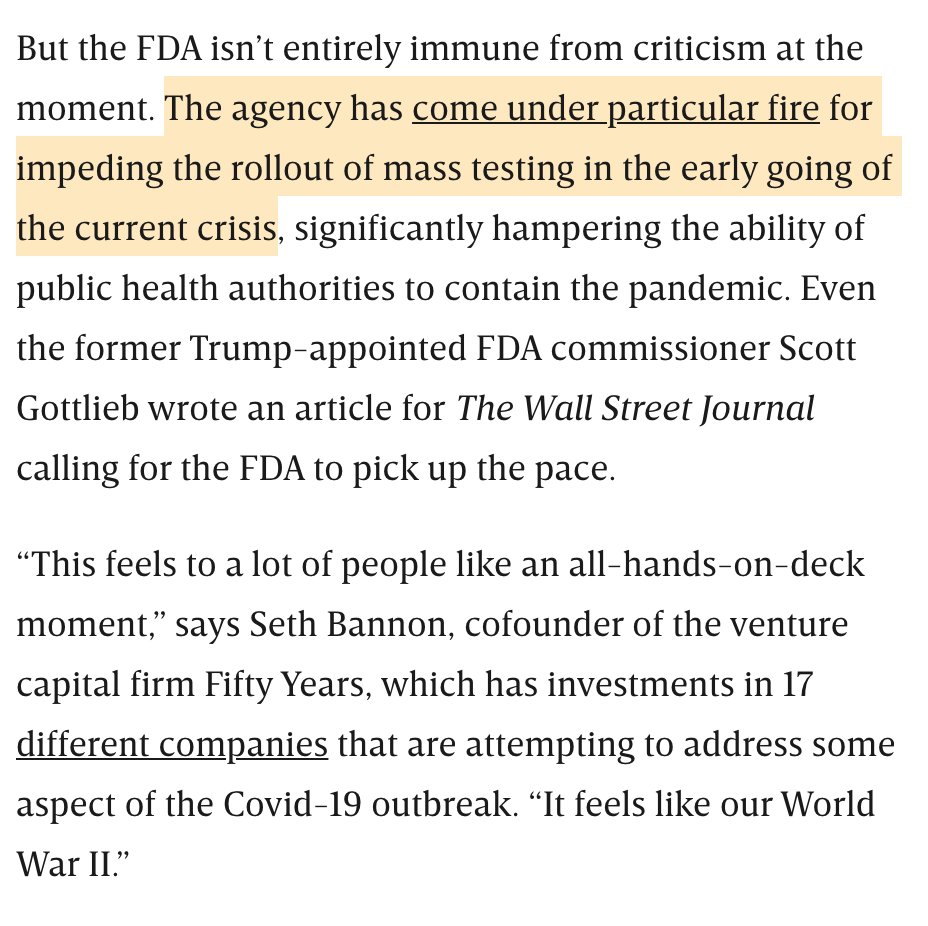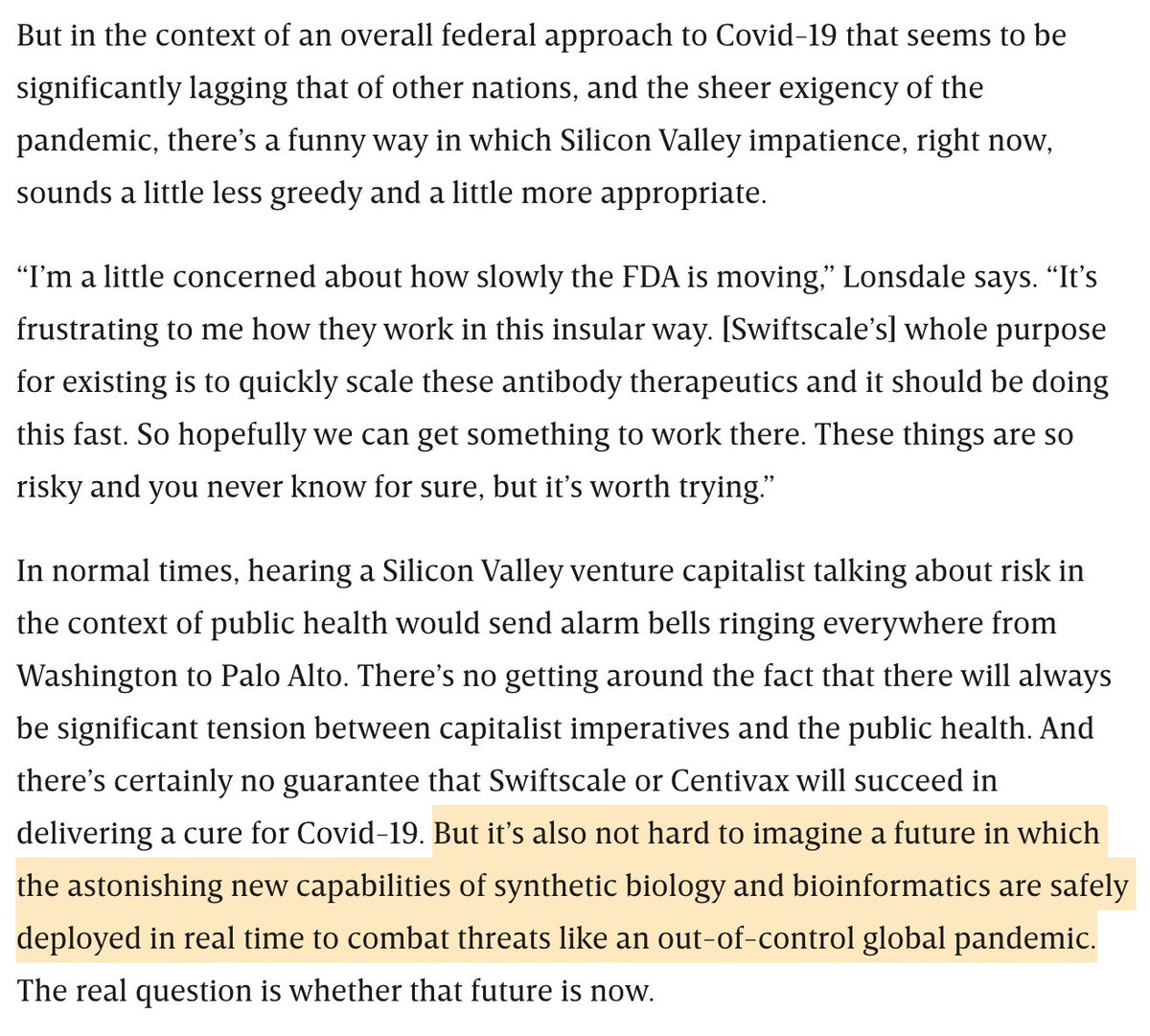Surprisingly good piece from @koxinga21 on how FDA roadblocks to rapid development of tests, drugs, and vaccines are finally being re-examined in the light of the coronavirus crisis.
So much of what the FDA does is "safety theater", like the TSA.
https://www.wired.com/story/chafing-against-regulation-silicon-valley-pivots-to-pandemic/">https://www.wired.com/story/cha...
So much of what the FDA does is "safety theater", like the TSA.
https://www.wired.com/story/chafing-against-regulation-silicon-valley-pivots-to-pandemic/">https://www.wired.com/story/cha...
The piece is an informative overview of some of the developments in the space, and I encourage you to read it. Great job by @nxthompson and @koxinga21.
If doing a followup, a story on FDA& #39;s ongoing interference with at-home testing would be worthwhile. https://twitter.com/balajis/status/1242224702682062848">https://twitter.com/balajis/s...
If doing a followup, a story on FDA& #39;s ongoing interference with at-home testing would be worthwhile. https://twitter.com/balajis/status/1242224702682062848">https://twitter.com/balajis/s...
Aside from the tech, a few things I wanted to comment on. One is how we might increase trust in light of profit motive. The second is why tech/biotech is "impatient".
A major concept: I think MANY biomed founders would take lower profits if they could get much faster approvals.
A major concept: I think MANY biomed founders would take lower profits if they could get much faster approvals.
As more background, the profit motive figures significantly in the piece (and in society) for why there is residual distrust of rapid biomedical innovation.
How can we take that off the table while still being able to earn the money to pay scientists, manufacture drugs, etc?
How can we take that off the table while still being able to earn the money to pay scientists, manufacture drugs, etc?
One idea might be for sovereign funds (or the pension fund of the "nation state of California") to take large stakes in biomedical companies.
Now profits would accrue to citizens.
There& #39;s another version where key nonprofits & researchers get a share. But concept is similar.
Now profits would accrue to citizens.
There& #39;s another version where key nonprofits & researchers get a share. But concept is similar.
It& #39;s just an idea. But if the state & its citizens had a financial interest in a biomedical innovation, it& #39;s harder to argue that it& #39;s purely a selfish endeavor.
Said interest could offset purely political opposition to a new innovation. As opposed to *genuine* quality concerns!
Said interest could offset purely political opposition to a new innovation. As opposed to *genuine* quality concerns!
This could be important because the level of regulatory capture in biomedicine is high.
Sometimes there is legitimate opposition to a new innovation for technical reasons, but often it& #39;s just relationships. Agencies & big companies get through. https://twitter.com/balajis/status/1246696104365719556">https://twitter.com/balajis/s...
Sometimes there is legitimate opposition to a new innovation for technical reasons, but often it& #39;s just relationships. Agencies & big companies get through. https://twitter.com/balajis/status/1246696104365719556">https://twitter.com/balajis/s...
Again, the question is: If lower profits boosted trust & yielded faster approvals of biomedical technologies -- **without** sacrificing quality -- how could you do that in a win/win way?
Generally I think many founders would sacrifice money for faster cures.
Generally I think many founders would sacrifice money for faster cures.
As color, many biomedical founders are trying to build a cure they can& #39;t buy. They can have similar "origin stories" to doctors. Sometimes a family history of disease. Or a personal experience. Many from academia.
So, many would trade monetary upside for speed of innovation.
So, many would trade monetary upside for speed of innovation.
Goes without saying (but let me reiterate) that you still want a process that gets you quality, without quality theater.
So you could combine this with expanded right-to-try. Take power away from FDA & give to states working with top unis in their area. https://twitter.com/balajis/status/1244110176489111552">https://twitter.com/balajis/s...
So you could combine this with expanded right-to-try. Take power away from FDA & give to states working with top unis in their area. https://twitter.com/balajis/status/1244110176489111552">https://twitter.com/balajis/s...

 Read on Twitter
Read on Twitter



